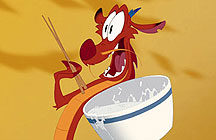|
|
|
|
Mulan
|
 |
|
Like Anastasia (1997) or Pocahontas (1995), the Disney animation Mulan smilingly offers itself to us as a weird hybrid of cultures, accents and musical styles. Recognisable elements of Chinese mythology, ritual and architecture jostle with a barrage of brash American voices; occasional Oriental harmonies are woven into modern dance beats and show-tune extravaganzas. In the wake of the controversy over the distribution of Kundun (1997), Disney is here trying to appease and flatter those who rule the Chinese market. Yet, as if to balance this safe side of the film, there is also something relatively progressive: a mildly feminist narrative line which puts a woman, Mulan (voiced by Ming-Na Wen), at the centre of action and historic change. Mulan is a headstrong teenager whose unwomanly independence scares her parents. When her frail father is called to fight the Huns, Mulan decides to disguise herself as a man and take his place. Once in the army, she begins the training process beloved of martial arts cinema – and also secretly swoons over the dishy Captain Shang. Mulan is a cross-dressing story – which is hardly novel within the tradition of romantic comedy, but it still seems daring in a Disney animation. The plot stays away from the trickier, saucier intricacies of such a masquerade, but it does pave the way for a marvellous reversal when a bunch of blokes dress as women to a reprise of the stirring anthem "We Are Men". This is only one of many camp, ironic touches in the film. As usual these days, Disney animations ensure that there is a gaggle of side characters who talk fast and cheeky – and also inject welcome references to contemporary pop culture. Eddie Murphy, as the voice of the disgraced dragon Mushu, bears the responsibility for this hip comedy, and he handles it with aplomb. Mulan is not in the league of The Little Mermaid (1989), but it moves quickly and has enough energy and invention to keep both young and old audiences satisfied. © Adrian Martin September 1998 |
![]()